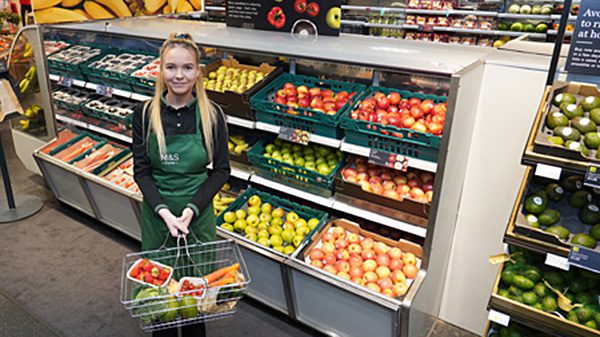(Photo courtesy of Marks & Spencer)
A United Kingdom-based retailer is testing a plastic-free produce department at one of its stores, along with measures across the whole banner, to reduce single-use plastic.
Marks & Spencer said in a news release it plans to become a zero-waste business by 2025.
This is the latest store to trial less plastic packaging in produce, though with a less-catchy name than New World supermarkets in New Zealand. The retailer is promoting its plastic-free produce as “food in the nude,” and touting sales increases up to 300% for some commodities since it switched back to bulk.
For Marks & Spencer, the three-month plastic-free trial is launching with 90 SKUs of loose fruit and vegetables. Some items are more commonly found bulk, like potatoes and bananas, but the initiative also includes soft fruits and berries, merchandised in compostable punnets, according to a news release.
The company also is introducing trained “greengrocers” to offer consumers advice on selecting and storing fresh produce, to minimize waste at home.
“Our trial at Tolworth is an important milestone in our plastic reduction journey and bringing back the traditional greengrocer will play a key part in educating our customers,” said Louise Nicholls, Head of Food Sustainability, in a news release. “Our plan is to create long-term impact in the future using tangible insights from the Tolworth store trial.”
The company also is removing “best before” dates from fresh produce as part of the trial.
United Kingdom-based Tesco PLC launched an initiative in May to remove “best before” dates on fresh produce and expanded the program in October after positive shopper feedback.
The company started with 70 items and added another 116 after follow-up research showed nearly 70% of customers believed removing “best before” dates is a good idea, and 53% said it makes a difference in food waste.
“Removing best before dates is our way of making it easier for customers to reduce food waste at home and save money in the process,” said Mark Little, Tesco’s Head of Food Waste Reduction, in a news release. “It’s simply not right that food goes to waste and we’re going to do everything we can help.”
A United Kingdom-based retailer is testing a plastic-free produce department at one of its stores, along with measures across the whole banner, to reduce single-use plastic.
Marks & Spencer said in a news release it plans to become a zero-waste business by 2025.
This is the latest store to trial less plastic packaging in produce, though with a less-catchy name than New World supermarkets in New Zealand. The retailer is promoting its plastic-free produce as “food in the nude,” and touting sales increases up to 300% for some commodities since it switched back to bulk.
For Marks & Spencer, the three-month plastic-free trial is launching with 90 SKUs of loose fruit and vegetables. Some items are more commonly found bulk, like potatoes and bananas, but the initiative also includes soft fruits and berries, merchandised in compostable punnets, according to a news release.
The company also is introducing trained “greengrocers” to offer consumers advice on selecting and storing fresh produce, to minimize waste at home.
“Our trial at Tolworth is an important milestone in our plastic reduction journey and bringing back the traditional greengrocer will play a key part in educating our customers,” said Louise Nicholls, Head of Food Sustainability, in a news release. “Our plan is to create long-term impact in the future using tangible insights from the Tolworth store trial.”
The company also is removing “best before” dates from fresh produce as part of the trial.
United Kingdom-based Tesco PLC launched an initiative in May to remove “best before” dates on fresh produce and expanded the program in October after positive shopper feedback.
The company started with 70 items and added another 116 after follow-up research showed nearly 70% of customers believed removing “best before” dates is a good idea, and 53% said it makes a difference in food waste.
“Removing best before dates is our way of making it easier for customers to reduce food waste at home and save money in the process,” said Mark Little, Tesco’s Head of Food Waste Reduction, in a news release. “It’s simply not right that food goes to waste and we’re going to do everything we can help.”
Pamela Riemenschneider is the Retail Editor for Blue Book Services.



